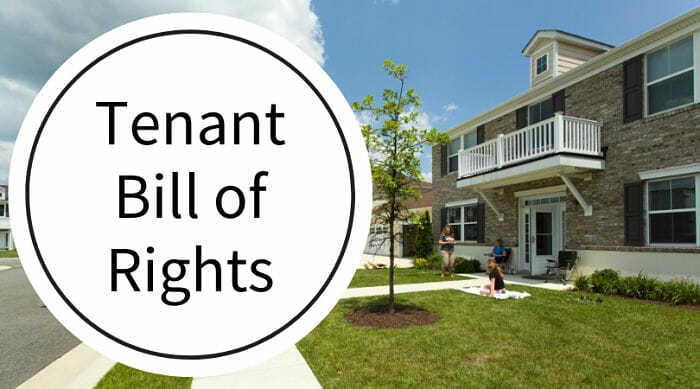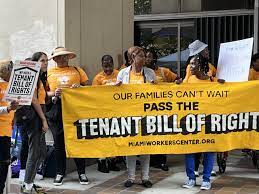760.27 Prohibited discrimination in housing provided to persons with a disability or disability-related need for an emotional support animal.—
(1) DEFINITIONS.—As used in this section, the term:
(a) “Emotional support animal” means an animal that does not require training to do work, perform tasks, provide assistance, or provide therapeutic emotional support by virtue of its presence which alleviates one or more identified symptoms or effects of a person’s disability.
(b) “Housing provider” means any person or entity engaging in conduct covered by the federal Fair Housing Act or s. 504 of the Rehabilitation Act of 1973, including the owner or lessor of a dwelling.
(2) REASONABLE ACCOMMODATION REQUESTS.—To the extent required by federal law, rule, or regulation, it is unlawful to discriminate in the provision of housing to a person with a disability or disability-related need for, and who has or at any time obtains, an emotional support animal. A person with a disability or a disability-related need must, upon the person’s request and approval by a housing provider, be allowed to keep such animal in his or her dwelling as a reasonable accommodation in housing, and such person may not be required to pay extra compensation for such animal. Unless otherwise prohibited by federal law, rule, or regulation, a housing provider may:
(a) Deny a reasonable accommodation request for an emotional support animal if such animal poses a direct threat to the safety or health of others or poses a direct threat of physical damage to the property of others, which threat cannot be reduced or eliminated by another reasonable accommodation.
(b) If a person’s disability is not readily apparent, request reliable information that reasonably supports that the person has a disability. Supporting information may include: 1. A determination of disability from any federal, state, or local government agency. 2. Receipt of disability benefits or services from any federal, state, or local government agency. 3. Proof of eligibility for housing assistance or a housing voucher received because of a disability. 4. Information from a health care practitioner, as defined in s. 456.001; a telehealth provider, as defined in s. 456.47; or any other similarly licensed or certified practitioner or provider in good standing with his or her profession’s regulatory body in another state but only if such out-of-state practitioner has provided in-person care or services to the tenant on at least one occasion. Such information is reliable if the practitioner or provider has personal knowledge of the person’s disability and is acting within the scope of his or her practice to provide the supporting information. 5. Information from any other source that the housing provider reasonably determines to be reliable in accordance with the federal Fair Housing Act and s. 504 of the Rehabilitation Act of 1973.
(c) If a person’s disability-related need for an emotional support animal is not readily apparent, request reliable information that reasonably supports the person’s need for the particular emotional support animal being requested. Supporting information may include: 1. Information identifying the particular assistance or therapeutic emotional support provided by the specific animal from a health care practitioner, as defined in s. 456.001; a telehealth provider, as defined in s. 456.47; or any other similarly licensed or certified practitioner or provider in good standing with his or her profession’s regulatory body in another state. Such information is reliable if the practitioner or provider has personal knowledge of the person’s disability and is acting within the scope of his or her practice to provide the supporting information. 2. Information from any other source that the housing provider reasonably determines to be reliable in accordance with the federal Fair Housing Act and s. 504 of the Rehabilitation Act of 1973. (d) If a person requests to keep more than one emotional support animal, request information regarding the specific need for each animal. (e) Require proof of compliance with state and local requirements for licensing and vaccinating each emotional support animal.
(3) REQUEST LIMITATIONS.—
(a) Notwithstanding the authority to request information under subsection (2), a housing provider may not request information that discloses the diagnosis or severity of a person’s disability or any medical records relating to the disability. However, a person may disclose such information or medical records to the housing provider at his or her discretion.
(b) A housing provider may develop and make available to persons a routine method for receiving and processing reasonable accommodation requests for emotional support animals; however, a housing provider may not require the use of a specific form or notarized statement, or deny a request solely because a person did not follow the housing provider’s routine method.
(c) An emotional support animal registration of any kind, including, but not limited to, an identification card, patch, certificate, or similar registration obtained from the Internet is not, by itself, sufficient information to reliably establish that a person has a disability or a disability-related need for an emotional support animal.
(4) LIABILITY.—A person with a disability or a disability-related need is liable for any damage done to the premises or to another person on the premises by his or her emotional support animal.
(5) APPLICABILITY.—This section does not apply to a service animal as defined in s. 413.08. History.—s. 1, ch. 2020-76.
760.29 Exemptions.—
(1)(a) [ single family dwelling, rental by the room, or owner occupied four unit ]
Nothing in ss. 760.23, 760.25, and 760.27 applies to: 1. Any single-family house sold or rented by its owner, provided such private individual owner does not own more than three single-family houses at any one time. In the case of the sale of a single-family house by a private individual owner who does not reside in such house at the time of the sale or who was not the most recent resident of the house prior to the sale, the exemption granted by this paragraph applies only with respect to one sale within any 24-month period. In addition, the bona fide private individual owner shall not own any interest in, nor shall there be owned or reserved on his or her behalf, under any express or voluntary agreement, title to, or any right to all or a portion of the proceeds from the sale or rental of, more than three single-family houses at any one time. The sale or rental of any single-family house shall be excepted from the application of ss. 760.20-760.37 only if the house is sold or rented: a. Without the use in any manner of the sales or rental facilities or the sales or rental services of any real estate licensee or such facilities or services of any person in the business of selling or renting dwellings, or of any employee or agent of any such licensee or person; and b. Without the publication, posting, or mailing, after notice, of any advertisement or written notice in violation of s. 760.23(3). Nothing in this provision prohibits the use of attorneys, escrow agents, abstractors, title companies, and other such professional assistance as is necessary to perfect or transfer the title. 2. Rooms or units in dwellings containing living quarters occupied or intended to be occupied by no more than four families living independently of each other, if the owner actually maintains and occupies one of such living quarters as his or her residence. (b) For the purposes of paragraph (a), a person is deemed to be in the business of selling or renting dwellings if the person: 1. Has, within the preceding 12 months, participated as principal in three or more transactions involving the sale or rental of any dwelling or interest therein; 2. Has, within the preceding 12 months, participated as agent, other than in the sale of his or her own personal residence, in providing sales or rental facilities or sales or rental services in two or more transactions involving the sale or rental of any dwelling or interest therein; or 3. Is the owner of any dwelling designed or intended for occupancy by, or occupied by, five or more families. (2) Nothing in ss. 760.20-760.37 prohibits a religious organization, association, or society, or any nonprofit institution or organization operated, supervised, or controlled by or in conjunction with a religious organization, association, or society, from limiting the sale, rental, or occupancy of any dwelling which it owns or operates for other than a commercial purpose to persons of the same religion or from giving preference to such persons, unless membership in such religion is restricted on account of race, color, or national origin. Nothing in ss. 760.20-760.37 prohibits a private club not in fact open to the public, which as an incident to its primary purpose or purposes provides lodgings which it owns or operates for other than a commercial purpose, from limiting the rental or occupancy of such lodgings to its members or from giving preference to its members. (3) Nothing in ss. 760.20-760.37 requires any person renting or selling a dwelling constructed for first occupancy before March 13, 1991, to modify, alter, or adjust the dwelling in order to provide physical accessibility except as otherwise required by law. (4)(a) Any provision of ss. 760.20-760.37 regarding familial status does not apply with respect to housing for older persons. (b) As used in this subsection, the term “housing for older persons” means housing: 1. Provided under any state or federal program that the commission determines is specifically designed and operated to assist elderly persons, as defined in the state or federal program; 2. Intended for, and solely occupied by, persons 62 years of age or older; or 3. Intended and operated for occupancy by persons 55 years of age or older that meets the following requirements: a. At least 80 percent of the occupied units are occupied by at least one person 55 years of age or older. b. The housing facility or community publishes and adheres to policies and procedures that demonstrate the intent required under this subparagraph. If the housing facility or community meets the requirements of sub-subparagraphs a. and c. and the recorded governing documents provide for an adult, senior, or retirement housing facility or community and the governing documents lack an amendatory procedure, prohibit amendments, or restrict amendments until a specified future date, then that housing facility or community shall be deemed housing for older persons intended and operated for occupancy by persons 55 years of age or older. If those documents further provide a prohibition against residents 16 years of age or younger, that provision shall be construed, for purposes of the Fair Housing Act, to only apply to residents 18 years of age or younger, in order to conform with federal law requirements. Governing documents which can be amended at a future date must be amended and properly recorded within 1 year after that date to reflect the requirements for consideration as housing for older persons, if that housing facility or community intends to continue as housing for older persons. c. The housing facility or community complies with rules made by the Secretary of the United States Department of Housing and Urban Development pursuant to 24 C.F.R. part 100 for verification of occupancy, which rules provide for verification by reliable surveys and affidavits and include examples of the types of policies and procedures relevant to a determination of compliance with the requirements of sub-subparagraph b. Such surveys and affidavits are admissible in administrative and judicial proceedings for the purposes of such verification. (c) Housing may still be considered housing for older persons if: 1. A person who resides in such housing on or after October 1, 1989, does not meet the age requirements of this subsection, provided that any new occupant meets such age requirements; or 2. One or more units are unoccupied, provided that any unoccupied units are reserved for occupancy by persons who meet the age requirements of this subsection. (d) A person is not personally liable for monetary damages for a violation of this subsection if such person reasonably relied in good faith on the application of the exemption under this subsection relating to housing for older persons. For purposes of this paragraph, a person may show good faith reliance on the application of the exemption only by showing that: 1. The person has no actual knowledge that the facility or the community is ineligible, or will become ineligible, for such exemption; and 2. The facility or community has stated formally, in writing, that the facility or community complies with the requirements for such exemption. A county or municipal ordinance regarding housing for older persons may not contravene the provisions of this subsection. (5) Nothing in ss. 760.20-760.37: (a) Prohibits a person engaged in the business of furnishing appraisals of real property from taking into consideration factors other than race, color, national origin, sex, disability, familial status, or religion. (b) Limits the applicability of any reasonable local restriction regarding the maximum number of occupants permitted to occupy a dwelling. (c) Requires that a dwelling be made available to an individual whose tenancy would constitute a direct threat to the health or safety of other individuals or whose tenancy would result in substantial physical damage to the property of others. (d) Prohibits conduct against a person because such person has been convicted by any court of competent jurisdiction of the illegal manufacture or distribution of a controlled substance as defined under chapter 893. History.—ss. 4, 8, ch. 83-221; s. 5, ch. 84-117; s. 5, ch. 89-321; s. 18, ch. 90-275; s. 1, ch. 96-191; s. 1792, ch. 97-102; s. 1, ch. 99-348; s. 4, ch. 2001-143; s. 59, ch. 2003-164; s. 9, ch. 2020-76; s. 4, ch. 2020-153. |




You must be logged in to post a comment.